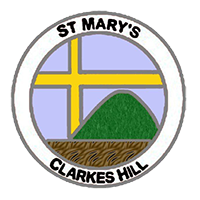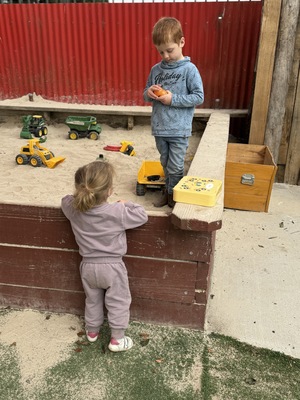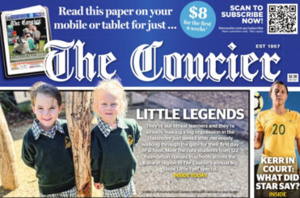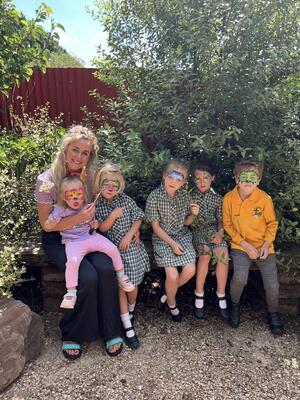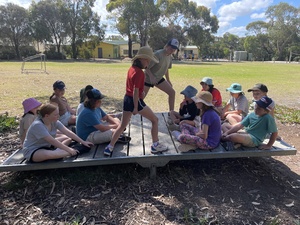History
St Mary’s School was opened in 1946. The Presentation Sisters and the Sisters of Mercy were the leading lights at St Mary’s for many years until the first lay Principal was appointed in 1974.
After the withdrawal of the Religious Orders, the locals continued their strong support of their community school. Student numbers have dwindled in the past but on these occasions the community has worked together to support our belief that Catholic Education is vital to the community.
This community involvement continues today and the success of the School and Catholic Education depends largely on the partnership between the community and the teaching staff.

Our Staff
St Mary’s School engages both teaching and non-teaching staff, on both a full and part-time basis. As a small staff we share in a number of Leadership roles, giving us the opportunity to participate in some worthwhile professional development.
Ms Clare Scanlon - Principal
Mrs Jenny Curran - Senior Classroom Teacher & Teaching & Learning Leader
Mrs Louise Haintz - Junior Room Classroom Teacher & Wellbeing Leader & Learning Diversity Leader
Mrs Sue Prendergast - Senior Classroom Teacher & Religious Education Leader
Mrs Kelly McGannon - Learning Support Officer
Mrs Majella Muller - Finance Administrator
Mrs Claire Hay - Administrator, Risk & Compliance Officer
Mrs Tina Handley - Pastoral Care Worker

Family School Partnerships
Learning that is grounded in relationships and supportive relationships can unleash the potential of every student. (Fullan and Langworthy, 2013)
Parents & Friends
The Association:
- Meets once a term
- Strengthens school community through supporting the work of the School Advisory Council
- Strengthens school community through organising faith building functions
- Strengthens school community through organising fundraising functions
- Strengthens school community through organising social functions
School Advisory Council
The St. Mary's School Advisory Council:
- Meets once a term
- Assists with the preservation, promotion and provision of informed advice to the Canonical Administrator
- Assists with planning for the present and future operating of the School
- Passes on information about Catholic Education to the community
- Formulating, ratifying and revising School Policy (with staff)
- Oversees School Finances
- Participates in regular formation activities
Introducing our Curriculum
Class Structure
Our School has two multi-age classes: Foundation to Year 2 make up the Junior class and the Senior class is Years 3–6.
Our small classes allow us to cater for the needs of individuals and supports children’s learning at the level that best suits them emotionally, spiritually, academically and socially.
The teachers at St Mary's use the Victorian Curriculum F-10 to assist them in directing the learning and teaching experiences children have within the classroom.
Learning Areas
Learning and teaching should be of the best standard possible and reflect the Vision and Mission Statements of the School.
It should recognise the role of parents as the primary educators of their children.
All children should have access to a comprehensive curriculum which includes the knowledge, skills, values and attitudes that will enable them to lead full Christian lives and play an active role in the world in which they live.
Teachers employ a variety of strategies when teaching children in multi-age groupings. These can include co-operative group work, whole class instruction, small and individualised instruction, parent helpers, individual research, role play, discussion, note taking and inquiry-based lessons. At St. Mary’s School we are very proud of our educational standards which are designed to accelerate learning for each child in our care.
AusVELS
Australian Curriculum in Victoria (AusVELS) has been fully implemented at St. Mary’s . It provides an approach to curriculum from Foundation to Year 10 that is designed to engage students, build their confidence, offer varied approaches to learning and challenge them to achieve.
The Victorian Curriculum F–10 sets out what every student should learn during their first eleven years of schooling. The curriculum is the common set of knowledge and skills required by students for life-long learning, social development and active and informed citizenship.
Learning Areas Capabilities
The Arts Critical and Creative Thinking
-
Dance Ethical
-
Drama Intercultural
-
Media Arts Personal and Social
-
Music
-
Visual Communication Design
English
Health and Physical Education
The Humanities
-
Economics and Business
-
Geography
-
History
Languages
Mathematics
Science
Technologies
-
Design and Technologies
-
Digital Technologies
Italian is also taught from Foundation to Year 6.
The LOTE (Languages Other Than English) program aims to develop students' skills in Italian. To develop the knowledge, understanding and skills to enable students to: communicate in Italian, understand language, culture and learning and their relationship, and thereby develop an intercultural capability in communication.
Religious Education Curriculum
St Mary’s School uses the Diocesan Religious Education Curriculum, "Awakenings".
"Awakenings" is a comprehensive and sequential curriculum framework that is informed by the Doctrine of the Catholic Tradition and is presented to teachers and students in a way that reflects current understandings about teaching and learning. "Awakenings" (p.55) states that:
Religious Education intends to awaken us intellectually:
by encouraging critical thinking and inquiry;
by firing our imaginative capacity;
by enlightening our experiences with reason;
by broadening our perspectives through Scripture and Tradition.
Religious Education intends to awaken us ethically:
* by forming moral character;
* by arousing our desire for wisdom;
* by attuning us to the attitudes of Jesus;
* by promoting responsibility and integrity in living.
Religious Education intends to awaken us spiritually:
* by relating our life to the mystery of God;
* by valuing our interior life and capacities;
* by developing prayerful and liturgical habits;
* by connecting compassion with justice.
We recognise that each child is unique in their ongoing faith formation. Teachers draw from the children’s life experiences so as to enable them to incorporate the Gospel values our school nurtures.
Parish Based Sacramental Program
The Sacraments of Reconciliation, Confirmation and First Eucharist are offered to children through a planned program over a two-year cycle. Preparation and support is extended through our Parish Based Sacramental Program and is supported by our school RE program.
Reporting
At St Mary's Clarkes Hill and St Brendan's Dunnstown, it is believed that reporting to the parents of our students should clearly communicate the achievements of the students and should also provide recommendations which will assist the students' future learning.
Accurate and comprehensive reporting of school and student performance aids in establishing open communication, helps to improve student learning, assists in establishing future direction and helps to identify areas of exemplary performance, as well as those in need of support and assistance.
